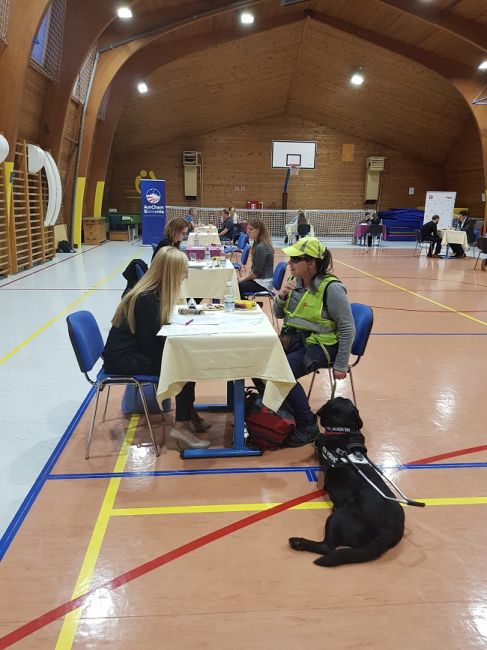
Many blind and partially sighted people experience difficulties in finding their way into employment. This is the reason we organized a Career fair for them, together with the IRIS Centre, within the framework of the Giving Back to the Community initiative. Many employers, who have undertaken short conversations with potential job seekers, participated in the career fair. The purpose of the fair was to introduce the topic of blindness and partial sight to employers.
The main goal of the career fair was to improve Personal Presentation Skills. There will be opportunities for further employment conversations, in case of any real interest. “Nothing brings more abundance into your life than when you give back to the community, because we are becoming better people with a greater sense for humanity. We feel the power and distress of others. The decision of Young Leaders Club members to collaborate with the IRIS Centre makes me happy. With the young people from the Centre for Blind and Partially Sighted People, they were even more aware of what life is and how important it is to look with your heart. Empathy and emotional intelligence are the key competences of the business future, but also of humanity, and we can learn them only when we step out of the frames of our self-sufficiency”, said Ajša Vodnik, CEO of AmCham Slovenia.
“As an educational institution, our main goal is that blind and partially sighted students gain a profession, are as independent as possible and are actively involved in the work process. Unfortunately, only a few of them can secure themselves an employment. The causes are different, but among the main ones, we can consider prejudices about the working skills of blind and partially sighted people, ignorance of state employment incentives and the possibility of adapting to the new working environment of blind and partially sighted jobseekers. The career fair, organized for the first time, together with AmCham Slovenia and the Association of Blind and Partially Sighted People, provides an incredible experience for both employers and blind and visually impaired jobseekers. The goal of today's interviews is not regular employment, but I still want to, and I hope that one of those of the blind and partially sighted participants will have the opportunity to show and prove what they know in the working environment. I sincerely thank all the participants who responded to the invitation”, added Katjuša Koprivnikar, Director of IRIS Centre, the only educational institution in Slovenia, which carries out adjusted education programs for blind and partially sighted children and adolescents.
It does not work without preparation
The candidates at the career fair, to which they applied through an online form, had a unique opportunity to learn about preparations and job interviews. They had to prepare themselves so that they inquired well and prepared questions about the company where they were seeking employment. First impressions are very important, so they did not forget proper clothes, handshake and body language.
“In particular, I was looking forward to establishing new contacts to open the door to the world of employment. Regarding the employment of blind people, in Slovenia, we are still living in the Middle Ages, as there is a lack of knowledge among employers of what we are capable of. I believe this is the biggest obstacle. Conversations at the fair have been a very positive experience. I got some new contacts”, said Leon Rojko, who is an economic technician by education.
“Such events like the career fair are important not only from the perspective of participants – interviewees, but from the point of view of potential employers. Many have gained experience and insight into how the job interview takes place. We also asked them things they did not expect. From our point of view, conversations are important for us to get to know blind and partially sighted people, to find out what they are capable of and what they have to offer. This way, we can easily integrate them into employment when this happens, because they have the skills and the competences that can be used, if we do our best and adapt the workplace." Maja Kožuh, Faculty of Economics
“I came here full of expectations, I read the recommendations for communication very precisely so that I would not do anything wrong. I have found that blind and partially sighted people are just normal people who have developed their competences. I tried to present behavioral interviews to them very briefly, because this is now a modern practice in HR, so they can be properly confronted with this if necessary. I have also met two potential candidates for our company, and gave them my business card. Now I expect detailed CVs so that we can talk further.” Gregor Rajšp, Mercator
“I was not quite sure how to behave, but the career fair clarified the understanding of stereotypes. If you do not have this kind of experience, the fair is a very good guide for the future. I realized that blind and partially sighted people may even be better at their work. In the first interview I met Anja, who worked as a telephone operator and created radio shows. She gave an excellent interview.” Gašper Hren, Danfoss Trata
General sponsor of Giving Back to the Community:
.jpg)

